|
|
|
Sort Order |
|
|
|
Items / Page
|
|
|
|
|
|
|
| Srl | Item |
| 1 |
ID:
193483
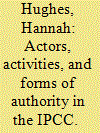

|
|
|
|
|
| Summary/Abstract |
Scholarship on global environmental assessments call for these organisations to become more reflexive to address challenges around participation, inclusivity of perspectives, and responsivity to the policy domains they inform. However, there has been less call for reflexivity in IPCC scholarship or closer examination of how routine concepts condition scholarly understanding by focusing on science and politics over other social dynamics. In this article, I suggest that scholarly reflexivity could advance new analytical approaches that provide practical insights for changing organisational structures. Through reflecting on my understanding of the IPCC, I develop actors, activities, and forms of authority as a new analytical framework for studying international organisations and knowledge bodies. Through its application, I describe the social order of the IPCC within and between the panel, the bureau, the technical support units, the secretariat and the authors, which is revealing of which actors, on the basis of what authority, have symbolic power over the writing of climate change. The fine-grained analysis of organisations enabled by this analytical framework reveals how dominance can and is being remade through intergovernmental relations and potentially, identifies avenues that managers of these bodies can pursue to challenge it.
|
|
|
|
|
|
|
|
|
|
|
|
|
|
|
|
| 2 |
ID:
105935
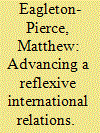

|
|
|
|
|
| Publication |
2011.
|
| Summary/Abstract |
This article advances a call for greater reflexivity in International Relations (IR) to uncover various intellectual and political biases that may obscure the research process. Inspired by existing reflexive practices in IR and, in particular, Pierre Bourdieu's use of such a method, it argues that reflexivity matters for enhancing ethically grounded research, in terms of not only the choice of subjects to study, but also how specific problems are treated, and hence what kind of results can be expected. However, the argument also goes beyond the appeal to autobiographical reflexivity to embrace other dimensions. This includes attention to institutional forces that shape the agency of the scholar and, in turn, the complex relationship between the academy and the wider political world. In the most ambitious sense, the potential for reflexivity can also be conceived collectively in terms of activist intellectuals who seek to reward reflexive practices through dialogue and political intervention. The social space of international trade politics is taken as an empirical example.
|
|
|
|
|
|
|
|
|
|
|
|
|
|
|
|
| 3 |
ID:
149594


|
|
|
|
|
| Summary/Abstract |
This paper describes the recent emergence of alternative food networks in China in the context of widespread food quality concerns. Drawing on interviews and public blog posts, we illustrate how participants in these networks are moving beyond instrumental market relations and developing the collective agency necessary to participate in shaping China's food system. We argue that the initiators and participants in these alternative food networks are not only individual shoppers who ‘vote with their chopsticks’, but are also nascent activists deploying grassroots community organising strategies. We reveal how these networks are using inclusive and reflexive processes to build diverse networks, how they are using internet communications to extend their reach, voice dissent and engage in nascent ‘bottom up’ policy formation, and how they are building influential connections and actively, but unofficially, expanding linkages to broader emancipatory spaces of global and social justice movements.
|
|
|
|
|
|
|
|
|
|
|
|
|
|
|
|
| 4 |
ID:
162766
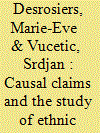

|
|
|
|
|
| Summary/Abstract |
What does causation mean in conflict studies? Using a sample of published qualitative, article-length studies on the Rwandan and Yugoslav wars, this article finds a lack of reflexivity over causal claims in scholarship on conflict. Causal language is not as pervasive as expected, asserted cause-effect relationships are rarely fully explicated, and scholars under-explore their causal assumptions. Considering that ideas on causation necessarily condition explanations of conflict, including “ethnic” conflict, this is a major research issue. While there exists a lively debate between different causal narratives regarding the onset of conflict—with studies alternatively stressing “attitudes,” “conditions,” or both—it stops short of addressing issues at the deeper level of causal understandings. For the most part, studies subscribe to the search for empirical generalization, thus limiting attendant debates to a single model of causation. These findings indicate that conflict studies literature would benefit from greater reflexivity and pluralism with regards to causation and paying more attention to philosophical debates on the subject. The article provides a basic outline of this reflexive agenda.
|
|
|
|
|
|
|
|
|
|
|
|
|
|
|
|
| 5 |
ID:
120089
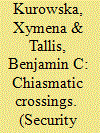

|
|
|
|
|
| Publication |
2013.
|
| Summary/Abstract |
This article makes an argument about chiasmatic knowledge production that seeks to cut across the entrenched division between the subject and object of inquiry, on the one hand, and the narrative and normative authority of the scholar, on the other, that is inherent in most writing in international relations. We revisit our own research encounter in the field of European security to explore the premises and implications of fieldwork relationships between researchers and practitioners and show their potentially transformative effects. Classifying such engagements as acts of professional transgression by both sets of parties overlooks their promise to facilitate the understanding of security practice 'from within' and to provide for tangible scholarly and political criticality. It is argued that, in the restricted realm of security, extensive interaction with practitioners could be a proxy for participant observation. Yet, we look further than that. We develop a concept of 'chiasmatic crossings' that reflects and helps theorize the ideational give-and-take and conceptual ruptures in the process of co-authorship that are indicative of distinct trajectories in European security research. This challenges the knowledge claims and static positions of both 'problem-solving' and 'critical' scholars in the field.
|
|
|
|
|
|
|
|
|
|
|
|
|
|
|
|
| 6 |
ID:
175156
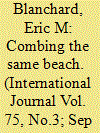

|
|
|
|
|
| Summary/Abstract |
Sil and Katzenstein present analytic eclecticism as a pragmatic, problem-driven, policy-oriented heuristic, posed against the paradigmatism and parsimony inhibiting the study of world politics. I argue that Sil and Katzenstein’s approach is both promising (in that it is one of the more flexible available frameworks to bring separate research traditions into fruitful dialogue) and potentially problematic (if it limits itself to the triad of realism, liberalism, and constructivism). Informed by a recent methodological turn in post-positivist International Relations (IR) and Political Science, this essay takes seriously eclecticism’s commitment to theoretical multilingualism by imagining an eclectic engagement beyond the heuristic’s original purview and calling for eclectic attention to reflexivity, constitutive theorizing, and the dynamics of power and ethics. The article reflects on existing disciplinary power dynamics and disparities and the urgent demand for scholars to more fully contribute to developing effective approaches to real-world threats, such as climate change.
|
|
|
|
|
|
|
|
|
|
|
|
|
|
|
|
| 7 |
ID:
195395


|
|
|
|
|
| Summary/Abstract |
In a recent article, Maria Eriksson Baaz and Swati Parashar1 trace the continued salience of Eurocentrism in critical International Relations (IR), demonstrating how the ‘master’s outlook’ continues to stifle the study of global politics; they ultimately encourage an unsettling and even implosion of the discipline. Starting from this proposed ‘implosion’ of critical IR, this article reflects on our hopes, as two current PhD candidates and one early career researcher in global politics, for teaching and learning in this future world. We begin by reflecting on our own complicity in reproducing the Western-centrism of the discipline and consider how this discomfort can be used productively. The article then considers the radical potential of the classroom and the necessity of empathetic, collaborative inquiry to the future of the discipline of global politics. We advocate for an IR which is imaginative, relational, messy, and vulnerable – and are hopeful about how this may animate a meaningful and sustainable implosion. Embracing our discomfort and the possibility of failure, we hope to contribute to the ongoing ‘unsettling’ of academia from the standpoint of incipient feminist scholars and hopeful early-career teachers.
|
|
|
|
|
|
|
|
|
|
|
|
|
|
|
|
| 8 |
ID:
179966
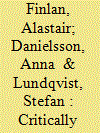

|
|
|
| 9 |
ID:
105924
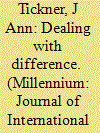

|
|
|
|
|
| Publication |
2011.
|
| Summary/Abstract |
This address suggests some avenues through which IR scholars from a variety of methodological approaches and different geographical locations might better dialogue with each other in mutually respectful ways. It begins by briefly revisiting IR's great debates since they represent the way the discipline has traditionally defined itself. It claims that these debates have centred on challenging the predominance of a US-centred discipline and its commitment to neo-positivist methodologies. Drawing on postcolonial and feminist literatures, it then offers some suggestions as to how might envisage an IR that is built on more global foundations and on a more pluralist understanding of what we define as scientific knowledge. It concludes with some thoughts on possible paths towards placing different scientific traditions on a more equal and mutually respectful footing.
|
|
|
|
|
|
|
|
|
|
|
|
|
|
|
|
| 10 |
ID:
129962
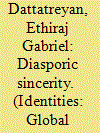

|
|
|
|
|
| Publication |
2014.
|
| Summary/Abstract |
This essay explores how my diasporic 'returnee' status positions me with the participants in my research endeavours within education reform non-governmental organisations (NGOs) in and around Bangalore, India. I argue that in addition to forcing me to reassess the scripts of 'belonging' I hold as an Indian American, the very stories that make me part of the diaspora reshape the research context by offering my interlocutors new narrative tropes by which to (re)imagine India. These re-imaginings precipitate a destabilisation of context-specific categories that limit social interaction, such as caste, class, gender and regional belonging, allowing me the possibility of ethnographically sincere encounters across a diverse set of participants. However, as I persistently transgress boundaries I find myself in vulnerable positions, as the politics of difference within the organisation threaten to undermine my research endeavour.
|
|
|
|
|
|
|
|
|
|
|
|
|
|
|
|
| 11 |
ID:
164283


|
|
|
|
|
| Summary/Abstract |
What does it mean to study security from a critical perspective? This question continues to haunt critical security studies. Conversations about normative stances, political engagement, and the role of critique are mainstays of the discipline. This article argues that these conversations tend to revolve around a too disembodied image of research, where the everyday practice of researchers is sidelined. But researchers do do research: they work materially, socially, and cognitively. They mediate between various feedback loops or fields of critique. In doing so, they actively build and exercise critique. Recognizing that fact, this article resists growing suggestions to abandon critique by, first, returning to the practice of critique through the notion of companionship. This permits us to reinvigorate our attention to the objects, persons, and phenomena through which critique gains inspiration and purpose, and that literally accompany our relationship to critique. Second, we explore what happens when our companions disagree, when critique faces controversies and (a) symmetries. Here, we support research designs of tracing credibility and establishing symmetries in order to move away from critique as denouncing positions we disagree with. Third, we discuss the relation between companionship, critique, reflexivity, and style. Here, the rhetorical practices of critical inquiry are laid out, and possibilities for its articulation in different and less silencing voices are proposed.
|
|
|
|
|
|
|
|
|
|
|
|
|
|
|
|
| 12 |
ID:
141522
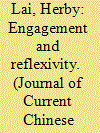

|
|
|
|
|
| Summary/Abstract |
Amidst political tensions between China and Japan, and against the backdrop of the patriotic education campaign in China that promotes a negative image of Japan as the victimiser, Chinese students in Japanese educational institutions study and work in Japan in a highly politicised context. In general, how they chose to interpret their experiences in Japan, and their views on history and controversial political issues involving China and Japan, demonstrates two levels of cosmopolitanism – namely, the ability and the willingness to engage with Japanese people on such issues, and reflexivity towards their own national identities. Meanwhile, some informants would deliberately avoid talking about history and controversial political issues involving China and Japan. While they lacked the willingness to engage with Japanese people on controversial issues, their keenness to separate their daily lives in Japan from the political context means they were also engaged in a reflexive reconfiguration of their national identities.
|
|
|
|
|
|
|
|
|
|
|
|
|
|
|
|
| 13 |
ID:
149112
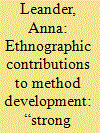

|
|
|
|
|
| Summary/Abstract |
Contrary to common assumptions, there is much to be learned about methods from constructivist/post-structuralist approaches to International Relations (IR) broadly speaking. This article develops this point by unpacking the contributions of one specific method—ethnography—as used in one subfield of IR—Critical Security Studies. Ethnographic research works with what has been termed a “strong” understanding of objectivity. When this understanding is taken seriously, it must lead to a refashioning of the processes of gathering, analyzing, and presenting data in ways that reverse many standard assumptions and instructions pertaining to “sound methods.” Both in the context of observation and in that of justification, working with “strong objectivity” requires a flexibility and willingness to shift research strategies that is at odds with the usual emphasis on stringency, consistency, and carefully planned research. It also requires accepting that the engagement of the researcher with the researched is no regrettable inevitability but a potential to be used and mobilized. If these arguments were more widely acknowledged, it would be easier to justify/recognize the methodological foundations of research in the ethnographic tradition. However, it would also require rethinking standard methods instructions and the judgments they inform.
|
|
|
|
|
|
|
|
|
|
|
|
|
|
|
|
| 14 |
ID:
145735
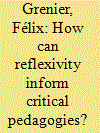

|
|
|
|
|
| Summary/Abstract |
The constitutive effects of teaching activities on the study of international relations (IR) and on the practice of international relations have generated a long-term interest in approaches to teaching and learning in IR. Recently, a cluster of literature has emerged that focuses on critical pedagogy in IR, which questions traditional relations of power, ideas, and norms in the classroom. However, these inquiries have yet to be systematically connected with reflexivity in IR (i.e., the developing awareness of the diversity, production, and positionality of knowledge). This article proposes that critical pedagogies and reflexivity are mutually reinforcing. It argues that applying reflexivity to teaching activities in IR raises awareness about the social conditions enabling the (re)production of specific understandings of the world. To support this proposition, the article presents and evaluates a trial IR seminar inspired by reflexivity. In this trial seminar, three aspects of reflexivity were developed (i.e., theoretical, sociological, and self-reflexivity), each of which supports critical pedagogy. This article explains how these three perspectives were infused into different trial seminar activities, to varying degrees of success. It also evaluates how the development of the reflexive agenda can be of particular benefit to IR scholars, IR students, and critical pedagogy as a whole.
|
|
|
|
|
|
|
|
|
|
|
|
|
|
|
|
| 15 |
ID:
192191
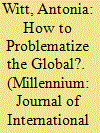

|
|
|
|
|
| Summary/Abstract |
International Relations (IR) has long been criticized for taking a particular (Western) experience as basis for formulating theories with claim to universal validity. In response, recent discussions have therefore centered on making IR ‘truly global’, that is, more inclusive and less parochial in its language and substance. But the concept of the global underpinning this discussion is both illusive and strongly contested. It requires problematization. But how? In this Forum, scholars discuss this question with a forward-looking agenda. Building on recent critical engagements with the question of the global as a concept in general and Global IR specifically, the authors ask how the global should be problematized in order to achieve a (more) progressive agenda for IR. They draw on different regional and disciplinary perspectives to both further the agenda of a less exclusive and racist discipline without falling into the trap of shallow inclusivity, and to discuss ways of problematizing the global without falling back into nativism or nationalism.
|
|
|
|
|
|
|
|
|
|
|
|
|
|
|
|
| 16 |
ID:
113401
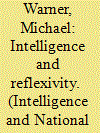

|
|
|
| 17 |
ID:
144067
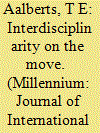

|
|
|
|
|
| Summary/Abstract |
This contribution to the forum discusses The Status of Law in World Society from the perspective of interdisciplinary research in International Law and International Relations. While problematising the mediation on interdisciplinarity itself, I suggest that the remainder of the book is an example of reflexive interdisciplinarity, which uses cross-disciplinary encounters to learn about disciplinary blindspots, hidden assumptions or silences, and to destabilise its certain knowledges and common senses. This is interdisciplinarity as counter-disciplinarity proper. Kratochwil shows how interdisciplinary research can be a non-imperialist, enriching and stimulating conversation, precisely because it refrains from dictating this in the form of a set research agenda with a delineated roadmap. The Status of Law instead highlights the scholarly merits of posing questions, being puzzled and having contestations as more important and productive features for our academic endeavour and interdisciplinarity itself.
|
|
|
|
|
|
|
|
|
|
|
|
|
|
|
|
| 18 |
ID:
194992


|
|
|
|
|
| Summary/Abstract |
The idea for this collection of papers emerged from a desire to showcase queer scholarship in and on the region, following a panel discussion about the visibility of queer communities in the post-Soviet space at the ASEEES virtual convention in December 2021. The panellists’ discussions highlighted the ongoing challenges of queer knowledge production and the tendency for scholarship produced by and on queer people in the region to be regarded as either ‘anomalous’ and/or ‘exotic’ and therefore treated as marginal. The contributions here challenge the latter argument by demonstrating that there are lessons to be learned from the experiences of queer people in the Caucasus and Central Asia. In this introduction, the guest editors explore the dominant themes that emerged from the articles in this issue. They also reflect on the politics of representation, reflexivity and research, and how they have sought to engage with them in editing this issue.
|
|
|
|
|
|
|
|
|
|
|
|
|
|
|
|
| 19 |
ID:
140442
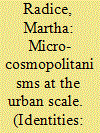

|
|
|
|
|
| Summary/Abstract |
Scholars may no longer see cosmopolitanism as the preserve of the jet-setting elite, but they still tend to focus on international travel as the primary means of acquiring cosmopolitan competence. However, one should not confuse mindsets with mileage: if travel does not always generate cosmopolitanism, then neither is it a precondition for it, so stay-at-homes can become cosmopolitan too. This article draws on ethnographic fieldwork in multiethnic neighbourhoods of Montréal, Quebec, to show how cosmopolitanism can be produced and practised within the microcosm of the city. While international mobility is not necessarily part of these negotiations of difference, other kinds of spatial and social mobility are, especially intra-urban mobility and mobility of the imagination. Examining micro-cosmopolitanism at the urban scale, however, also reveals that practices of and aspirations towards cosmopolitanism do not necessarily coincide.
|
|
|
|
|
|
|
|
|
|
|
|
|
|
|
|
| 20 |
ID:
161634
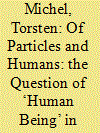

|
|
|
|
|
| Summary/Abstract |
Drawing on quantum theory, Alexander Wendt’s Quantum Mind and Social Science suggests a thought-provoking reorientation of the social sciences. Addressing some of the key assumptions in Wendt’s account, this article argues that despite a quite elaborate and eloquent development of a monist ontological position, conceptual discussions remain solely focused on the nature of beings and neglect wider implications for the nature of being, particularly human being, that arise out of its abandonment of a substance ontology.
|
|
|
|
|
|
|
|
|
|
|
|
|
|
|
|
|
|
|
|
|